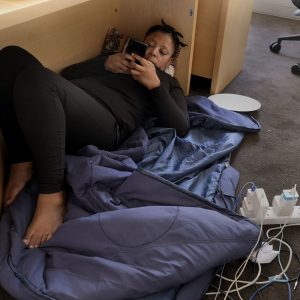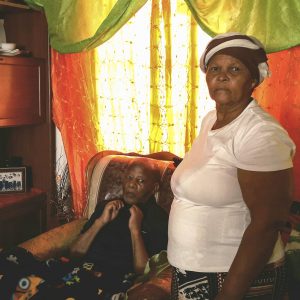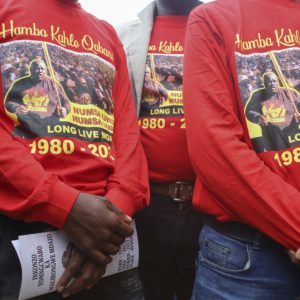New Books | Insurgency in the Global South
Black women workers at a Simba Chips factory in Johannesburg fought for better conditions, contracts and wages. Their efforts are emblematic of the ongoing struggle against inequality.
Author:
20 September 2021

This is a lightly edited excerpt from Organizing Insurgency: Workers’ Movements in the Global South (Pluto Press, 2021) by Immanuel Ness.
Case study: Campaign to regularise Simba Chips workers
Among the most significant campaigns waged by the Casual Workers Advice Office (CWAO) and the Simunye Workers Forum (SWF) is the organisation of workers employed at Simba Chips, a South African subsidiary of the international conglomerate PepsiCo. Simba workers are predominantly Black South African women who are employed as contractors, receive no minimum wage and do not earn enough for daily survival expenses. Simba Chips employs 500-600 temporary employees on rotating shifts through NAMPAK, a labour broker. Founded in 1957, the Simba (Swahili for “lion”) company was purchased by PepsiCo Food Production. PepsiCo claims to adhere to a code of conduct, stating: “Our Global Code of Conduct describes the ‘purpose’ behind our performance and is designed to help us meet our obligations, show respect to one another in the workplace and act with integrity in the marketplace.”
Yet, despite this ostensibly principled code of conduct, Simba Chips and PepsiCo secure labour brokers to seek out the lowest-wage workers by contracting all workers. Simba Chips sought to recruit women, and as reported in The New Worker, some workers believed they faced discrimination if the employer knew they had children: “A lot of us women didn’t say that we had kids, because we thought they would fire us. In time, we learned that having kids, being single mothers, was in some cases a guarantee that we would be even more exploited. They knew we needed the money.”
The breakdown of formal labour-management relations at Simba Chips has stimulated the temporary service employees there to directly mobilise with the sustained support of CWAO and SWF. By providing legal and organisational guidance to workers, a synergy developed between Simba Chips labourers and CWAO/SWF. Workers were energised by the support, and engaged in sustained actions to end the oppressive temporary employment services (TES) labour regime which consigned the workers to low wages, oppressive conditions and lack of job stability.
The Simba Chips workers campaign was a long and drawn-out struggle of organising for legal rights and recognition from PepsiCo. From 2016 through 2018 and beyond, Simba Chips workers engaged in spontaneous strikes to protest against low wages and their conditions of subordination. To demonstrate their frustration with the labour contracting system, over 300 Simba Chips workers left their jobs to attend a conciliation hearing at the Commission for Conciliation, Mediation and Arbitration (CCMA) in Benoni, South Africa, on 13 September 2017. The militant protesters, mostly comprising women, spontaneously stopped work at the Isando factory to attend the hearing. They demanded that the long and drawn-out process by the labour commissioners be resolved in favour of their equalisation and regularisation as employees. The crowd forced the commissioners from their rooms as nervous Simba lawyers requested a postponement of the hearing.
Related article:
According to CWAO newspaper The New Worker: “On returning to the factory later in the day, the workers found their line managers packing chips in a desperate attempt to meet their production targets. This confirmed what worker leader Nandi Grobler said in a general meeting just days before the event: ‘We are the most important people and management should bow before us when they walk past. They must lie down like the Venda people. Because we are important, we do the job for them. Say all of us don’t go to Simba today, there will be no money for them!’”
In response to the workers who had attended the CCMA hearing, Simba Chips sent written warnings to the 170 activist workers for walking off the job.
It is notable that the Food and Allied Workers Union (FAWU) was the delegated representative of workers at the Simba Chips factory, but through the labour broker system non-union workers were recruited to all the positions. As a consequence, the capacity of FAWU to represent the workers was severely compromised. FAWU had presided as the union of record during the transition to the labour broker system, and was unsuccessful in organising the workers employed at the factory. In sharp contrast to FAWU, CWAO/SWF, which had emerged as the major force in mobilising Simba Chips workers, was instrumental in mobilising the workers who were contracted through labour brokers. Ironically, FAWU is the second-largest affiliate of the South African Federation of Trade Unions (Saftu), the breakaway federation from the Congress of South African Trade Unions (Cosatu), which is pledged to worker empowerment, militancy and redistributive policies. FAWU had waged a long strike against Simba in the summer of 2002 demanding higher wages and improved working conditions. Subsequently, Simba had contracted out most of its workers.
Women have played a central role in the struggle for temporary service employees, and the struggle for regularisation at Simba Chips helped build strong leadership. On Saturday 10 March 2018, 446 workers attended a SWF/CWAO meeting to commemorate International Women’s Day and to protest against the informal status and poor conditions at Simba Chips and PepsiCo, which also contracted labourers in Argentina, where workers waged a major struggle against the labour broker system.
As a consequence of the very poor wages, lack of job security and oppressive conditions at Simba, TES workers employed at the expansive Isando plant near OR Tambo Airport began organising for a strike against the company for alleged attempts to contravene labour laws by arbitrarily contracting them from a third-party temporary employer. CWAO claimed that Simba and PepsiCo South Africa colluded with labour broking company Adcorp Blu to evade the requirements of section 198 of the Labour Relations Act. This legislation stipulates that after a three-month period, a labour broker-employed worker must become a direct employee of the company, in this case Simba. Adcorp Blu defines its mission to use contracting to reduce labour costs as follows: “When your outsourcing partner sees the future before you do, they can help you craft an idyllic future. And when they embody your business’s own personality, it becomes ever easier to co-create solutions: to accelerate productivity, ensure business continuity and reduce costs. That’s us. That’s Adcorp Outsourcing.”
Related article:
CWAO organiser Ronald Wesso explained that the Simba Chips workers’ campaign rallied worker support against the labour brokerage scheme, which denied fundamental protections under South African labour law, leading workers to recognise their exploitation and engage in spontaneous industrial unrest leading up to a call to strike in April 2018: “The labour-brokered workers want to put an end to the neoliberal approach adopted by almost all big companies, in which labour broking is used to undermine temporary workers and to treat workers as temporary while they are doing permanent work. As a consequence, workers are denied living wages, fair treatment and the right to collective bargaining.”
The notice of the strike was sent to the CCMA on Monday, and the strike would start on Thursday 19 April 2018, with up to 600 workers expected to participate. According to a statement from CWAO and SWF, in response to workers’ demands that their conditions of employment be restored, including their transport allowances, salaries and roles, Simba’s strategy was to delay the legal process as much as possible, to intimidate and victimise the workers in order to demobilise them, and to change the way production was managed in order to undermine the legal claims of the workers. The CWAO/SWF statement said that the strike formed part of a longer struggle at Simba. In addition to the failure to directly employ the workers, CWAO/SWF charged that the conditions at the packing plant in Isando were rife with sexual discrimination and harassment. The Simba workers’ complaint stated: “Women are forced to work in the cold storage areas when they are pregnant and they are put on night shift all the time, which puts their safety at risk in the plant and during their travels between work and home.”
On 19 April, the SWF/CWAO organising campaign achieved its most important goal when Simba Chips met the workers’ demands to change their casual jobs into permanent ones, ending a long, drawn-out conflict over employment status. SWF/CWAO’s successful organising campaign is all the more remarkable because the workers achieved their goals three months before the South African Constitution Court ruling ordered an end to the abuse of the TES programmes, meaning that all workers hired by third-party contractors would be required to be made permanent after three months of work. But in the meantime, National Union of Metalworkers of South Africa (Numsa) was engaged in its own struggles against the TES industry, being the major plaintiff in a key case against a major labour broker contracting workers for the multinational steel corporation ArcelorMittal.
South African Constitutional Court ruling
Numsa was the plaintiff in the legal case against the labour broker system at the South African Constitutional Court on 26 July 2018 in a decision affirming the rights of labour broker workers against the TES industry.
In the case, the Constitutional Court ruled in favour of Numsa that workers earning R205 000 (approximately US$11 300) per year or less who are contracted through a labour broker to a client firm for more than three months become employees of the firm. The court ruled that they should be: “employed on the same terms and conditions of similar employees, with the same employment benefits, the same prospect of internal growth and the same job security”. After three months, the labour broker is no longer the employer of the worker.
In the court case between Numsa and Assign Services (Pty) Limited, a labour broker, the court ruled that marginal workers are deemed to be employees of the temporary service employer only for three months, and that these same vulnerable workers must become employees of the broker’s client after the completion of three months.
In South Africa, the Left looks to Numsa as the union which will transform the turgid labour movement into a mobilising force for change and militancy. Numsa has demonstrated its resolve by opposing the ANC and the Tripartite Alliance, leading to its expulsion from Cosatu in 2014. Numsa leaders recognise that it holds a crucial position in tangibly upholding the principles of the Freedom Charter by building a socialist, anti-imperialist bloc. The union’s leadership understands that achieving a multiracial socialist South Africa requires strong bonds with community social movements and the establishment of a political party to challenge the dominant power. Upon Numsa’s expulsion, it called for the building of a United Front and a socialist political party to expropriate and nationalise national resources, redistribute land, and challenge the South African power structure controlled by the ANC. In this way, Numsa would have to form a Tripartite Alliance of a party, social movement and militant union that would contend for political power.
Related article:
Thus, while Numsa as a trade union emerged as the militant union force aligned with Left forces in opposition to the ANC, South African Communist Party (SACP) and Cosatu, it also needed to build a unified national coalition to challenge neoliberal capitalism. The transformation could not emerge immediately in 2014, as the process of creating a union federation, social movement and socialist party takes time and requires significant internal and external struggles. Consequently, Numsa has fitfully built an opposition by immediately forming a coalition with the United Front (UF), a coalition of social movements throughout South Africa established by Saftu in 2017 as a Left federation of unions, and the main force in building the Socialist Revolutionary Workers Party (SRWP) as an independent force in 2019. These efforts can easily be belittled and disparaged as too little too late, but Numsa must be given credit for taking these initial steps. Establishing a viable socialist political party to challenge the ANC and other forces will take many years, and its viability must be assessed on a long-term basis, rather than on short-term electoral results.
To gain popular support as a reliable force for change, Numsa has engaged in political struggles throughout the country, extending its organising beyond its core manufacturing sector and devoting resources to building labour support within communities, waging legal campaigns and supporting and leading worker mobilisations and strikes. Even though Numsa has opponents on the Left, it has become the key social organisational force in defending the South African working class, including unorganised and non-union workers. Though CWAO/SWF contend that established unions have failed to mobilise informal workers, Numsa has replaced Cosatu as the main trade union force in opposition to the labour brokerage system. Numsa has successfully organised workers beyond the metals industry and manufacturing sector, extending its reach to other industries. While Numsa, the United Front, Saftu and the SRWP advocate principles of socialism and anti-imperialism, they must secure the support of the broader Black South African working class to coalesce as a major force to viably challenge the ANC and the current capitalist state.



